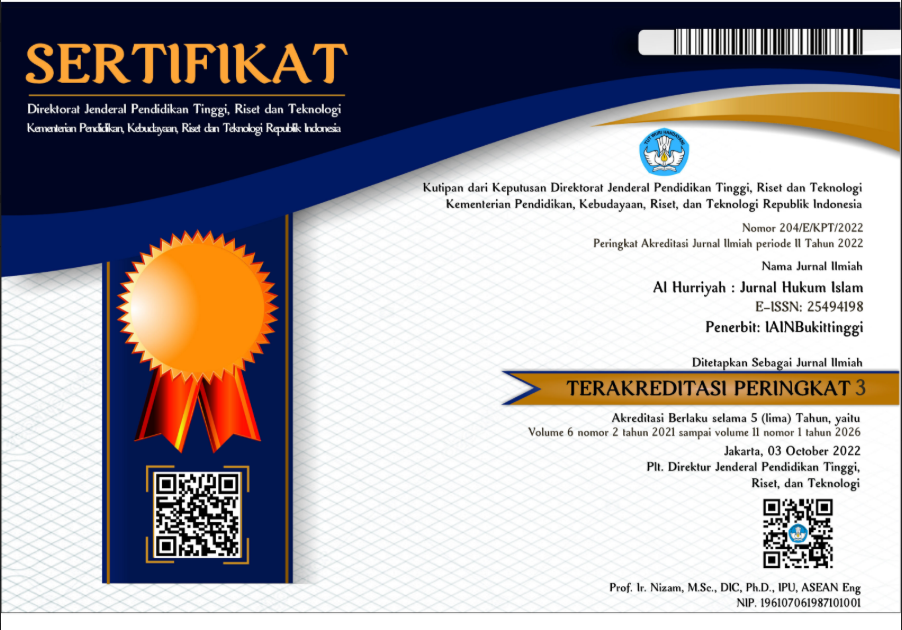PENGGUNAAN ISTISHAB DAN PENGARUHNYA TERHADAP PERBEDAAN ULAMA
DOI:
https://doi.org/10.30983/alhurriyah.v2i1.244Abstract
References
Abu Zahrah, Muhammad. Ushul al-Fiqh. t.t. Kairo: Dar al-Fikr al-Arabi.
Al-Bugha, Musthofa Dib. Atsar al-Adillah al-Mukhtalafu Fiha fi al-Fiqh al-Islami. t.t. Damaskus: Dar al-Imam al-Bukhari.
Al-Marghinani, Ali bin Abi Bakar. Bidayatul Mubtadi. v. I. t.t. Kairo: Maktabah Muhammad Ali.
Al-Nawawi, Yahya bin Syaraf. Al-Majmu. v. II. t.t. Kairo: Nasr Zakaria Ali.
Al-Subki, Ali Abdul Kafi. Al-Ibhaj. v. III. 1404 H. Beirut: Dar al-Kutub al-Ilmiyyah.
Al-Suyuthi, Jalaluddin. Al-Asybah wa al-Nadzair. v. I. 1997. Mekah: Maktabah Nizar Musthafa.
Al-Syafi’i, Muhammad bin Idris. Al-Umm. v. I. t.t. Kairo: Tab’ah Kitab al-Sya’b.
Al-Zuhayli, Wahbah. Al-Wajiz fi Ushul al-Fiqh. 1999. Damaskus: Darul Fikr.
Al-Zuhayli, Wahbah. Ushul al-Fiqh al-Islamy. v. I. 1986. Damaskus: Dar al-Fikr.
Fadal, Moh. Kurdi. Kaidah-kaidah Fikih. 2008. Jakarta: CV Artha Rivera.
Ibnu Abidin, Muhammad Amin. Hasyiyah Ibni Abidin. v. I. t.t. Kairo: Matba’ah al-Halabi.
Ibnu al-Qayyim, Muhammad bin Abi Bakar. I’lam al-Muwaqqi’in. v. I. 1973. Beirut: Dar al-Jil.
Ibnu Anas, Malik. Al-muwatta. v. I. t.t. Kairo: Matba’ah al-Halabi.
Ibnu Qudamah, Abdullah bin Ahmad. Al-Mughni. v. I. t.t. Kairo: Al-Maktabah al-Azhariyyah.
Imam, Muhammad Kamaluddin Imam. Ushul al-Fiqh al-Islami. 1996. Beirut: Muassasah al-Jamiyyah.
Mubarok, Jaih. Metodologi Ijtihad Hukum Islam. 2002. Yogyakarta: UII Press.
Syarifuddin, Amir. Ushul Fiqh. v. II. 2008. Jakarta: Kencana.
Downloads
Published
How to Cite
Issue
Section
Citation Check
License
Authors who publish with this journal agree to the following terms:
- Authors retain copyright and grant the journal right of first publication with the work simultaneously licensed under a Creative Commons Attribution-ShareAlike 4.0 International License that allows others to share the work with an acknowledgment of the work's authorship and initial publication in this journal.
- Authors are able to enter into separate, additional contractual arrangements for the non-exclusive distribution of the journal's published version of the work (e.g., post it to an institutional repository or publish it in a book), with an acknowledgment of its initial publication in this journal.
- Authors are permitted and encouraged to post their work online (e.g., in institutional repositories or on their website) prior to and during the submission process, as it can lead to productive exchanges, as well as earlier and greater citation of published work (See The Effect of Open Access).





